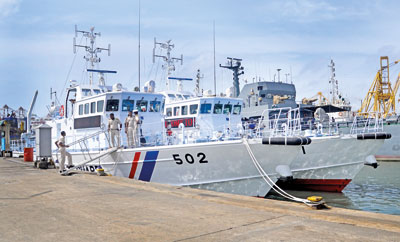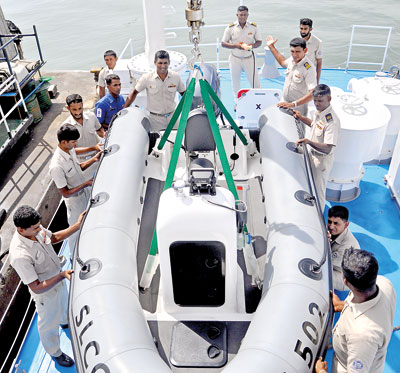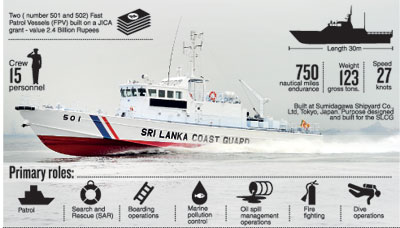News
Two ‘made-in-Japan’ FPVs bolster Sri Lanka Coast Guard
View(s):Two new fast patrol vessels (FPV), custom-made in Japan for the Sri Lanka Coast Guard (SLCG) and equipped for, among other things, marine pollution control, will be commissioned on Wednesday.
The 1.8bn yen (Rs 2.4bn) project was funded by a Japan International Coorporation Agency (JICA) grant. Both vessels underwent extensive sea trials during the last few weeks in preparation for the ceremonial commissioning and are expected to bolster the SLCG’s ‘white hulls’ fleet which recently also saw the addition of an Indian-built offshore patrol vessel (OPV).

The FPVs are the first purpose-built modern craft for the SLCG and bring with them new capabilities and technology to play several roles. Pix by Priyantha Wickramarachchi
The FPVs are the first purpose-built modern craft for the SLCG and bring with them new capabilities and technology to play several roles. They are 30 metres in length, have an endurance of 750 nautical miles and a displacement of 123 tons each. Both were built at the Sumidagawa Shipyard in Tokyo.
Powered by two German built MTU engines and a Hamilton water jet propulsion system, each FPV is capable of a top speed of 27 knots. The vessels are primarily designed for law enforcement missions while being equipped to perform a range of other roles, said SLCG Spokesman Capt Ravindra Tissera.
They are the first to come equipped for marine pollution control with a flotation boom and skimmer system that can contain and skim oil spills at sea. They can also spray chemical oil dispersants which break the oil up into small droplets, increasing the likelihood of it biodegrading. They each have a rigid hull inflatable boat and firefighting equipment that can project water in excess of 70m.
The vessels are capable of conducting patrols, search and rescue (SAR), humanitarian assistance and disaster response (HADR) and boarding operations at sea. The vessels will be have a crew of 15 personnel, including specialists trained in diving, pollution control and boarding operations, said Commander K M P Perera, Commanding Officer of FPV 502. Lieutenant Commander MACP Abeyawardena will be the Commander Officer of FPV 501. Both were trained in SAR, pollution control and oil spill management as well as boarding operations in Japan and the United States.
This week, the Japanese Minister of Defence was in Sri Lanka for the first time. Itsunori Onodera visited the Hambanthota and Trincomalee ports, promoting discussion on enhancing security cooperation between Japan and Sri Lanka with a focus on the sea. Japan has proactively assisted its international partners in the Indo- Pacific region through capacity building of coastguard agencies and other law enforcement organisations.

The FPVs are the first to come equipped for marine pollution control with a flotation boom
| JICA promotes Coast Guard programmes | |
| The Japan International Cooperation Agency (JICA) with assistance from the Japanese Coast Guard has assisted in the SLCG’s capacity building and skill development efforts.Training programmes have laid emphasis on maritime aspects of international law, countering maritime crimes and pollution control. Under JICA knowledge co-creation initiatives–such as the maritime safety and security policy programme–SLCG officers can obtain postgraduate degrees at the National Graduate Institute for Policy Studies and Japan Coast Guard Academy. Three seats have been already offered for the 2018 Japanese fiscal year. A capacity development programme on oil spill incident management and combating techniques is expected to be implemented from 2019 as part of a three-year technical cooperation project. There is also a possibility that Japanese Coast Guard officials will come to Sri Lanka as JICA experts to transfer knowledge to the SLCG. |
| SLCG at a glance | |
The Department of Sri Lanka Coast Guard (SLCG) in its present form was established in 2010 under the Coast Guard Act No 41 of 2009. It has 1,400 personnel with 100 officers and 1300 other ranks. They are empowered as peace officers and the SLCG holds jurisdiction as a law enforcement organisation at sea and on the coast. It works with other agencies, including the Police, Customs, the Marine Environment Protection Authority and the Department of Wild Life Conservation. They are empowered as peace officers and the SLCG holds jurisdiction as a law enforcement organisation at sea and on the coast. It works with other agencies, including the Police, Customs, the Marine Environment Protection Authority and the Department of Wild Life Conservation. The Sri Lanka Air Force and Sri Lanka Navy help it conduct search and rescue operations in territorial and international waters. The SLCG also holds regular training exercises with other coast guard services such as the United States Coast Guard, the Indian Coast Guard, the Pakistani Maritime Security Agency, the Maldivian Coast Guard and the Japanese Coast Guard. It has several bases along Sri Lanka’s coastline and is headquartered in Wellawatta. It also operates 12 lifesaver substations around the island. |

